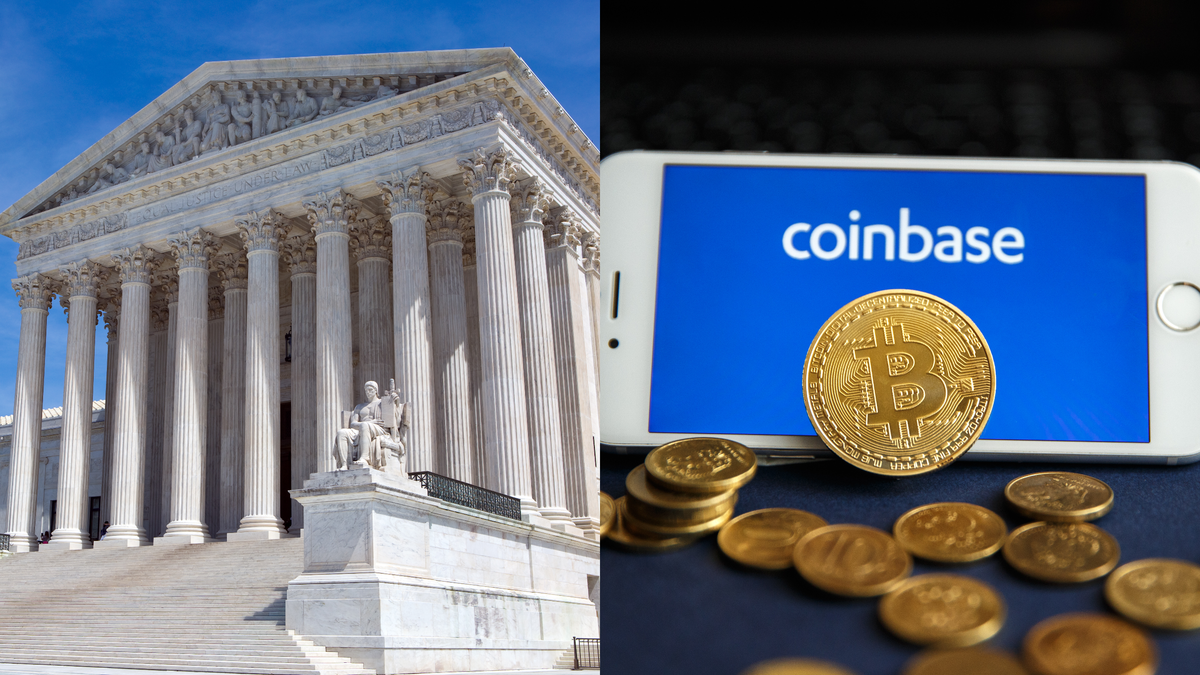Cryptocurrencies and crypto exchanges have gotten all sorts of federal attention in recent years. From the Securities and Exchange Commission to the Department of Justice to the U.S. Senate—many government agencies and lawmakers have begun to weigh in on blockchain business. Now, for the first time, the Supreme Court is getting involved.
The highest U.S. Court is hearing arguments in it’s first ever crypto-adjacent case on Tuesday. The case, Coinbase v. Bielski, is not specifically concerned with the classification, legality, or regulation of cryptocurrency. Rather, the Supreme Court is set to decide whether or not Coinbase, Inc., the operator of the second largest crypto exchange, can force two separate customer class action lawsuits into arbitration and put other legal proceedings on hold in the meantime.
Though it’s not the most exciting or technical court case, it could have broad implications for how crypto companies address customer complaints moving forward. It’s also likely to be followed by a string of future cryptocurrency cases headed towards the Supreme Court—including the ultimate question of how crypto is classified and regulated. “It’s just the tip of the tip of the iceberg on crypto-related litigation,” Gerard Comizio, a business law professor at American University, told Bloomberg.
One pending case in New York federal court, involving the SEC and crypto company Ripple, could move onto appeals and eventually the Supreme Court. Grayscale Investments, another crypto company, has also indicated it would be willing to take its ongoing case to the Supreme Court, per Bloomberg.
But What is Coinbase v. Bielski About?
Tuesday’s hearing concerns forced arbitration. Coinbase is fighting two separate customer lawsuits, both of which the company has claimed shouldn’t be allowed to go to court. Instead, the crypto exchange wants to take them to arbitration and stop all other legal proceedings in the meantime.
Arbitration is an alternate means of dispute resolution that happens outside of the court system. It’s often preferred by companies and included as a mandatory clause in employee and customer contracts (i.e. “any dispute…will be settled by binding arbitration). In practice, it generally favors corporations, quashes the potential for class actions by atomizing wronged parties into individual complainants, and cloaks proceedings behind closed-doors—eliminating the more transparent and public record of a court case.
Coinbase, like many companies, includes an arbitration requirement in its user agreement. Yet two class action suits against the crypto exchange have gotten this far because lower courts in California have ruled that Coinbase’s arbitration clause is “unconscionable” and uses a “litigation gimmick” to favor the company over its customers.
Consumer and worker-rights advocates, along with many democratic lawmakers, aren’t fans of forced arbitration, but the Supreme Court historically has been. Ultimately, the conservative, current set of judges are expected to side with Coinbase, according to SCOTUSblog’s analysis.
Why are Coinbase Customers Suing in the First Place?
The first of the class action suits at the center of the Supreme Court case focuses on a complaint from plaintiff Abraham Bielski, who claims Coinbase should compensate him for funds lost to a crypto scammer. Bielski says he lost $31,000 after falling for a ploy in which someone imitated a PayPal representative.
The second class action suit, Suski v. Coinbase, is over a sweepstakes event that the primary plaintiff and other customers claim was misleading. To enter the “million-dollar” event, some customers say there were led to believe they needed to trade $100 in dogecoin. But apparently, anyone could enter—regardless of dogecoin purchases/sales.
Coinbase has been facing an increasing number of customer lawsuits. If the Supreme Court ends up ruling in the company’s favor, as expected, many of those legal headaches could be all but disappeared into the black hole of corporate arbitration.







